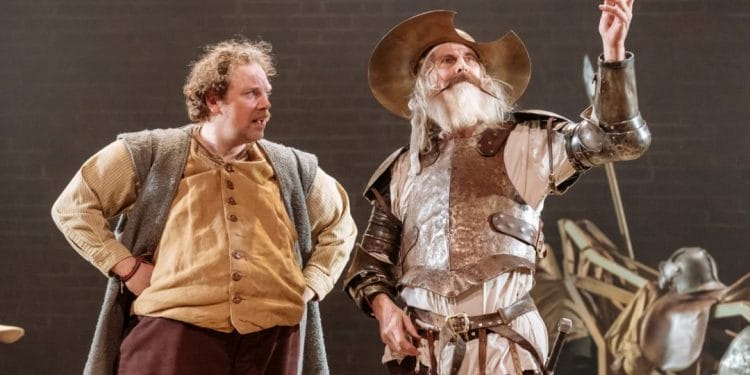 It probably says a great deal about a production when not just one, but both lead actors return to reprise their roles after two years, as is the case with the RSC’s Don Quixote, last seen at the Swan Theatre in Stratford and now enjoying a West End transfer at the Garrick. James Fenton adapts Cervantes’ sprawling literary masterpiece for the stage, allowing the much-lauded tome to be enjoyed by a new audience.
It probably says a great deal about a production when not just one, but both lead actors return to reprise their roles after two years, as is the case with the RSC’s Don Quixote, last seen at the Swan Theatre in Stratford and now enjoying a West End transfer at the Garrick. James Fenton adapts Cervantes’ sprawling literary masterpiece for the stage, allowing the much-lauded tome to be enjoyed by a new audience.
“We are gathering dust here” says Rufus Hound’s Sancho Panza in one of the early scenes, thankfully this isn’t a reference to the length of the production, as Cervantes’s epic novel has been pared back to a more manageable two and half hours, but moves at break neck speed as Don Quixote and his faithful squire make their way through their series of adventures.
The stage adaptation remains faithful to the premise of the novel, the passionate bibliophile Alonso Quixano is driven to the point of insanity after reading a few too many romantic novels, and attempts to recreate the age of chivalry in his Spanish homeland. Taking on the guise of Knight errant Don Quixote La Mancha, and enlisting Sancho Panzo to help him. Don Quixote mistakes windmills for giants, and flocks of sheep for armies, defeating them one by one in the name of his beloved, but fictional Dulcinea del Toboso.
In the role of Don Quixote, David Threlfall paints a vivid image of an aging nobleman whose sanity is tested to the limit. As he clatters around the stage in tarnished armour, and a barber’s basin serving as his helmet, his performance at times resembles that of a King Lear, and it is the RSC after all, but Threlfall goes on to give a masterclass in comedy with every move he makes. Paired with Rufus Hound, as they are for most of the production, it’s a comedy team made in heaven.
The Swan Theatre has clearly served as the inspiration for the staging, the bare brick walls and wooden floor is recreated on the Garrick stage, while Don Quixote and Sancho Panza travel from town to town in episodic form on horse and ass respectively. The animals are wooden dollies, pushed or pulled by attention seeking members of the ensemble, creating some of the funniest moments of the evening.
It is these sight gags which work incredibly well under the direction of Angus Jackson, many of them are so discreet you really have to paying attention to catch them, but it’s worth it. There’s more obvious physical comedy, often slapstick in nature, and subtly delivered one-liners. Don Quixote is unmistakably a play, but with so many songs, written by James Fenton and Grant Olding, and with live music accompanying, it could almost pass for a musical.
Just as Cervantes used a number of literary devices in the original, the stage adaptation throws a number of theatre styles in to the mix, from the interweaving drama and comedy, to puppetry and improvised stand-up. It is in those unscripted moments that Rufus Hound proves his worth, especially when on opening night a fire alarm temporarily halted proceedings, giving Hound more opportunity to demonstrate his quick wit, and ability to engage the audience.
Don Quixote is a production that manages to immerse the audience in more ways than one, it’s an uproariously funny and satisfyingly entertaining production, which is sure to entice audiences back again, as it already has done with its terrific lead cast.


























